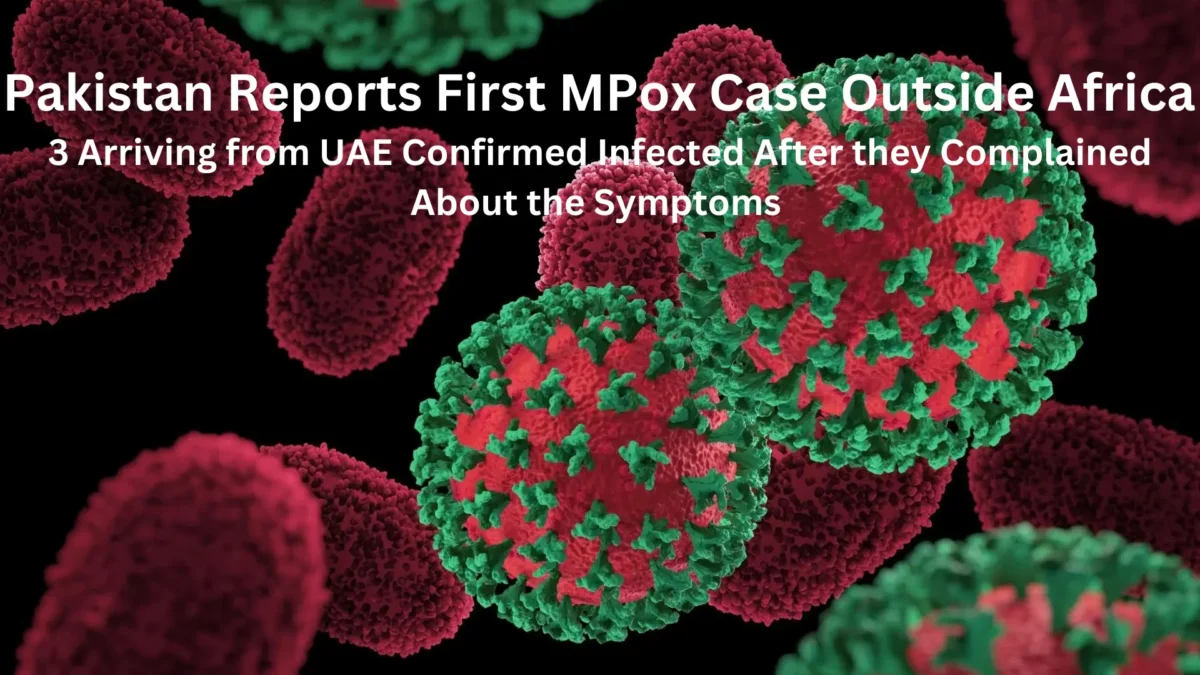Introduction: Understanding the Significance of the First Mpox Case Outside Africa
Mpox, a viral disease known for its severe impact in certain African regions, has now crossed borders, with the detection of first mpox case outside Africa continent. Pakistan’s health department in the northern Khyber Pakhtunkhwa province has confirmed the detection of three cases of the Mpox virus, formerly known as the monkeypox virus.
The report, released on Friday highlights that it remains unclear which specific variants of the virus have infected the patients. This development marks a significant instance of the Mpox case outside Africa and has sent ripples through global health communities, sparking concerns over the potential for a widespread mpox outbreak outside Africa. The identification of this mpox case outside Africa raises numerous questions about the virus’s transmission, potential health impacts, and the necessary measures to prevent further spread.
The Background of Mpox: What We Know So Far
Mpox, or Monkeypox, is a zoonotic virus primarily found in tropical rainforest regions of Central and West Africa. The mpox virus or a monkeypox virus is similar to smallpox but generally less severe, although it can be fatal. Historically, outbreak of Mpox virus have been contained within Africa, with few cases reported elsewhere, mainly among travellers. However, the recent detection of an mpox case outside Africa has shifted the narrative, emphasizing the need for a global response.
The Virus: Characteristics and Transmission
Mpox is caused by the Monkeypox virus, part of the Orthopoxvirus genus, which also includes variola virus (smallpox), cowpox virus, and vaccinia virus. Transmission typically occurs through direct contact with the blood, bodily fluids, or cutaneous or mucosal lesions of infected animals. Human-to-human transmission is less common but can occur through respiratory droplets or contact with infected materials.
The First Mpox Case Outside Africa: A Detailed Account
The first Mpox case outside Africa was confirmed in Pakistan recently. A 34-year old male patient from Mardan along with 2 others arrived from UAE on August 03, 2024. Few days later they developed symptoms including fever, intense headache, lymphadenopathy, and a characteristic rash, and reached out to the hospital for testing in Peshawar. Upon confirmation, health authorities immediately isolated the patient and began contact tracing to prevent further spread.
Symptoms and Diagnosis
The symptoms of Mpox typically appear within 5-21 days of exposure and begin with fever, headache, muscle aches, and exhaustion. Swelling of the lymph nodes is a key differentiating factor from smallpox. The rash, which usually starts on the face, eventually spreads to other parts of the body, including the palms of the hands and soles of the feet.
Global Response: How the World is Reacting to the First Case of Mpox Outside Africa
The detection of Mpox case outside Africa has prompted a swift response from global health organizations. The World Health Organization (WHO) has issued guidelines for monitoring and containment, while governments are heightening surveillance and reinforcing health infrastructure to manage potential cases. The global community is now on high alert, and countries are working together to share data and resources.
Preventive Measures and Public Health Guidelines
Health authorities are emphasizing the importance of early detection, isolation of cases, and vaccination for high-risk groups. Public health campaigns are being launched to educate the public about the symptoms of Mpox and the importance of seeking medical care if they suspect an infection.
The Science Behind Mpox: What Makes It Spread Beyond Africa?
The spread of Mpox case outside Africa may be attributed to various factors, including increased global travel, changes in land use leading to greater human-animal contact, and potentially, mutations in the virus that enhance its transmissibility. Ongoing research aims to understand these factors better and develop strategies to prevent further spread.
Recent Studies and Research
Several studies are currently being conducted to explore the genetic makeup of the Mpox virus and its transmission dynamics. Researchers are also looking into the effectiveness of existing vaccines, such as the smallpox vaccine, in providing protection against Mpox.
Potential Implications: What This Means for Global Health Security
The emergence of Mpox case outside Africa serves as a reminder of the interconnectedness of global health. It highlights the importance of international collaboration in addressing infectious diseases and underscores the need for robust public health systems that can respond to emerging threats.
Preparing for Future Outbreaks
In light of this development, countries around the world are reassessing their preparedness for potential outbreaks. This includes stockpiling vaccines, enhancing diagnostic capabilities, and strengthening international health regulations to ensure a coordinated response.
Conclusion: Moving Forward in a World with Mpox
The first detection of Mpox case outside Africa marks a pivotal moment in the global understanding of this virus. As health authorities work to contain the situation, the world watches closely, recognizing the need for vigilance, research, and cooperation in preventing the spread of this and other emerging infectious diseases.



